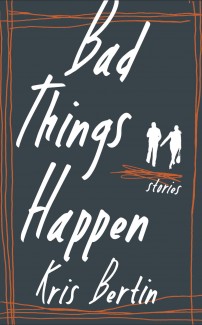Kris Bertin is from Halifax. His stories have appeared in The Walrus, The Malahat Review, TNQ, and PRISM International. He has twice won the Jack Hodgin’s Founder’s Award for Fiction and has appeared in The Journey Prize Anthology. His first collection of short stories Bad Things Happen (Biblioasis, 2016) has received very good reviews in the Toronto Star and Quill & Quire – good thing too, because it is it a gritty, funny, and memorably weird book. Brad de Roo avoided a lot of bad things on the internet to interview Kris Bertin for carte blanche this March
Your book’s title could be read as an axiomatic lament and/or an enticing warning about the book’s dramatic content. Is making bad things happen to characters axiomatic of good stories, of good dramatic form? Have you ever reached a point in writing a story where the bad things happening to characters went too far?
To me the title is both true false. In the titular story, hunky Jason Parvis (whose house is broken into by a couple of curious teen girls) tries to explain away the misery of his hoarder household by saying bad things happen, though we find out he lost his family through some act of extreme selfishness. It’s true that bad things happen, but a lot of the time, we’re the ones responsible for it.
It does seem clear that having bad things happen to characters is part of writing stories, in the sense that conflict is a fundamental element of fiction, but it is also true that you can go too far. I have stories in my story graveyard that will never see the light of day because they’re too bleak. Even in putting this collection together with Biblioasis and my editor Alexander MacLeod, more than anything I was careful to order the stories according to tone. I have some stories that ask a lot of the reader’s stomach, and which even took a lot out of me just to write. I didn’t want readers to ever feel overwhelmed though, so you’ll probably notice heavier stuff is often sandwiched with work that doesn’t wrench your guts as much.
 In the story “Is Alive and Can Move,” there’s a break in the story and it flashes forward from the beach to three years later, when the narrator is clean and out of prison. In draft #1, I had a very detailed description of what happens on the beach. I decided it wasn’t something that I wanted to share, and the story was much better as a result.
In the story “Is Alive and Can Move,” there’s a break in the story and it flashes forward from the beach to three years later, when the narrator is clean and out of prison. In draft #1, I had a very detailed description of what happens on the beach. I decided it wasn’t something that I wanted to share, and the story was much better as a result.
Some of your stories, like “Make Your Move” and “The Eviction Process” incorporate possible worlds in their narratives. Characters entertain many alternate actions and outcomes before facing crucial conflicts or epiphanies. False endings abound. Is this openness indicative of a personal theory about how narratives work or maybe reflective of how hard it is to revise to a final edit? Does this narrative open-endedness owe anything to Choose Your Own Adventure stories?
I love Choose Your Own Adventures, and actually have a small library of CYOA fiction that I put together (a project made easy in the age of Ebay). My wife teaches at a middle school and uses them to reward good kids at the end of class, and they love them as much as I did. There’s something incredible about those books—especially the early ones, the Edward Packard ones—where it feels like anything can happen. It’s like old Star Trek episodes. Endlessly creative and imaginative, fun and frightening, colourful and deeply, deeply rewarding for the audience.
My interest in multiple endings or possible narratives is more of a reflection of the way I think people process information—in real life—in order to try and predict the best (or worst) outcome. In all of my stories where characters think about what will happen, what might have happened, or multiple things that might come to pass, they’re mostly trying to cope with the burden of their decisions. What’s the right move? What would have happened if I were here at the same time as my enemies? What—if any—chance do I have to be happy here? What would my life be like if I hadn’t opted to leave town with a strange and dangerous woman?
Waste is strewn throughout these stories – from Jason’s house in “Bad Things Happen” to the detritus of addiction in “The Eviction Process”. Characters have professions that clean up others’ messes. They wash dishes, clean windows and dorms, exterminate rabid animals, and collect trash. What about filth and junk sticks with you? Is the setting of a story “a landfill in miniature”, to repurpose a quote from “The Narrow Passage”? Is it an author’s job to make sure nothing, however filthy, stays hidden, to remodel a sentiment from the same story?
I think a lot of that stuff is there because I’m very familiar with it. My brother put himself through college washing high-rise windows. My first job was as a janitor, cleaning a call centre from midnight until six am. I’ve known hoarders, and I’ve cleaned up after them as a general labourer. I’ve spent a lot of times in dish-pits and have done landscaping, some exterminating, some garbage. All of this stuff reflects, in some way, my real experiences.
While I was doing these things, I was especially fascinated with people’s private lives. Not their porno stash or whatever (though of course, that too), but their homes, their basement dens and offices. What they value and keep, where they keep it. Why you have a picture of Hulk Hogan on the wall. Why a rotting apple core can be left in a cup in your bathroom. Why your house is filled with hundreds of boxes and bags. I spent a year in Toronto as a mover, and was truly dazzled by some of the messes I saw. The question that Richard from ‘The Narrow Passage’ keeps asking—why is it like this—is something that you can’t stop thinking on the job. And yes, I think it’s important to look, to tear it open. A mess requires an answer. A mess has a story. It is worthwhile to look at one and zoom in as close as we can stomach.
Houses and buildings take on a heightened presence in many stories. They are almost characters in “Crater Arms” and “Is Alive and Can Move”. What about architecture is story-worthy? Is your approach even slightly aproPoe (sorry!) of “The Fall of the House of Usher”?
What I most like about architecture is the way it represents some of the best things humanity has to offer. Craftsmanship, dedication, careful planning, mathematics, geometry, physics. Architecture is a testament to civilization. Until the people go inside it. Then it doesn’t matter how lofty the ceilings are, how level the floor is. It doesn’t inspire civilized behavior. An ape in a pretty place is still an ape. In “Is Alive and Can Move”, even though our narrator is in a university, a seemingly sterile place with lots of straight lines, there’s no shortage of debauchery to be witnessed. The campus buildings becoming more antagonistic to him is clearly a delusion, but it reflects the very real depravity that can exist anywhere that houses people. This is a bit like “Usher”. A place takes its meaning from people, always. That’s interesting to me.
A recent review of Bad Things Happen in Quill & Quire suggests that your story “Crater Arms” is “tinged with David Lynch-style grotesquerie”. Do you relate to the Lynch connection?
I love Lynch. He’s a master of tone and atmosphere, his work is truly special, and it came to me when I really needed it. I guess there’s a few very bizarre features to “Crater Arms”, including a horrifying waking dream and a ten-foot tall god in glowing green robes, which could seem Lynch-ian. I appreciate the comparison. I’ve always said that the best compliment I can get about my stories is ‘weird’, because all weird really means is “unlike what we’re familiar with”. This is also known as “creative” or “original”, and is a huge compliment. Lynch, as we all know, is very weird.
Your love of comics is something that appears in past interviews (Naben Ruthnum’s Malahat Review Q & A, for example) and in your stories, especially in “Is Alive and Can Move”. These interviews mention a comic in the works. How does the work go? What appeals to you about comics?
Comic books are this amazing medium somewhere between movies and books, a kind of living narrative machine made of pictures and words that you activate with your mind. You can read a 22-page comic book in two minutes or slow it down and take an hour if you want to. I usually do both, several times. They’re appealing to write because they’re collaborative, endlessly fun, and there’s no limit to the kinds of stories you can tell. It doesn’t feel like there’s gatekeepers. Even after becoming a gigantic industry working in tandem with Hollywood, comics still don’t take themselves too seriously. I like that.
The comic book I’m working on is a 275 page graphic novel that’s about a gang of teen detectives solving a bizarre murder mystery in rural Nova Scotia. It’s fun and weird, ominous and heartwarming. Speaking of Lynch, my elevator pitch for the story is that it’s Scooby Doo Gang meets Twin Peaks in the Maritimes. I wrote and created it with my friend Alexander Forbes, who is drawing these amazingly complex panels with beautiful lines in stark black and white, reminiscent of the illustrations from Nancy Drew or Tom Swift novels. I’m done part, and he’s 1/3 done his. It is long, hard work, but the result is breathtaking. We’re currently looking for a home for it.
If you could compare the bad side of CanLit to any of the criminal activities or operations present in your book, which crime would best describe the times?
There’s a story in my collection called “Everywhere Money” about telephone scammers, where everyone is toiling away, waiting for the great big boss to come and get them. This can happen to CanLit writers, but maybe only on twitter, and only after you’ve made some kind of social or PC faux pas. If the bad side of CanLit were a criminal operation, Omertà would be in full effect. Or maybe only half effect. We would all claim that we get along just fine, and swear to never slander one another, only to viciously attack each other behind closed doors. Members would covet what others have, even if they earned it, even if it has nothing to do with anyone else, even if they’re humble about it. Just like real mobsters we’d lie to our families, only it’d be about how hard our work is, about how much we earn, and about where we got our money (government kickbacks, mostly). But as unscrupulous as we are, even the most cunning among us would be seduced by rival factions, publishers and magazines, who tell us that exposure is as good as a real paid publication, which has got to be the biggest fiction of them all.
